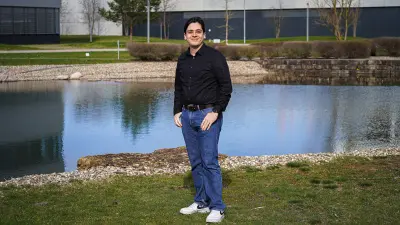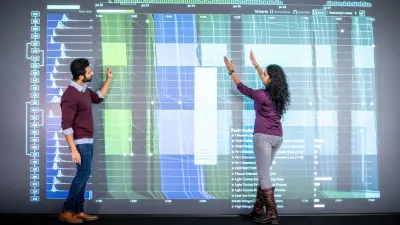Industry Sabbatical at Bosch Research
Gaining insight and making connections

Meet Diego Rincon, who took an industrial sabbatical at Bosch Research and shares his experiences and the benefits of taking a sabbatical at Bosch.
Can you tell us a little bit about yourself?
My name is Diego Rincon. I am currently finishing my PhD in the Neuro Symbolic AI field at the University of Salerno in southern Italy. I joined Bosch about a year ago for their industry sabbatical program.
My background is somewhat unusual for a PhD student as I am 39 years old. I completed my undergraduate degree in 2006, so it has been quite some time. However, back in my home country, Colombia, I worked in several roles in the technology sector, gaining over 15 years of industry experience. I have worked for the government, academia, and corporations, so I am well acquainted with industry technology scenarios and how they work. Nevertheless, research in an industrial environment has always appealed to me, so I decided to take a sabbatical at Bosch Research during my doctorate.
How did you come across the opportunity to join Bosch Research for the industry sabbatical program?
I discovered the program at a scientific conference called the Extended Semantic Web Conference (ESWC), where I presented a paper. Bosch Research was also represented there. My supervisor within the program at Bosch, Evgeny Kharlamov, is also passionately involved in the semantic web community and was present at the conference. It was through him that I became aware of the Industry Sabbatical Program at Bosch Research.
For those unfamiliar with the concept of an industry sabbatical, could you explain what it entails?
An industry sabbatical is a voluntary period during doctoral studies in which researchers temporarily pause their work at a university to focus on a specific research area within a company. The program can be tailored to the specific needs and requirements of the PhD students.
The Bosch Research Industry Sabbatical therefore is a promising career opportunity for PhD students with an interest in industry. It is a program that, in my opinion, should be given more attention.
If you have any questions about integrating a sabbatical into your doctorate and the resulting opportunities, the university supervisors and the Bosch Industry Sabbatical contacts and project managers are always available.
What are the benefits of the Industry Sabbatical?
There are several key benefits I have gained from this industry sabbatical:
First, the networking opportunities at Bosch Research have been invaluable. Through the EU project Data Cloud, I have had the opportunity to interact with people from many spheres. The project consortium includes individuals from various countries across the European Union, such as France, Spain, Italy, Norway, Sweden, and Portugal. This has broadened my scope, not only within my research field, but also among those who use my research for practical applications. It provides a well-rounded perspective and opens doors to potential collaborations and future opportunities, whether in academia or industry.
Second, being part of the Artificial Intelligence Research Department at Bosch Research has shown me the state-of-the-art knowledge in AI. All the researchers are constantly exposed to the latest developments and advancements in the field. Moreover, the department organizes regular workshops and events and invites top-notch guest lecturers to share their ongoing work and insights. This allows me to stay abreast of cutting-edge research and industry trends. It's a unique advantage to be part of such a community that actively engages with the frontiers of knowledge.
When I discovered the scope of the industry sabbatical, I was pleasantly surprised by the depth of the research ecosystem here at Bosch Research. I didn't expect to have such a deep connection with in-depth, cutting-edge research, so it turned out to be an enriching experience.
Can you tell us a little bit about your research field and what you are researching in your PhD?
My research focuses on the integration of symbolic AI and neural AI, which is commonly referred to as Neuro-Symbolic AI. This is about representing human knowledge in a very specific way. For example, some types of knowledge such as common sense can be exemplified by statements like “Paris is the capital of France.” These statements can be structured as triplets, with Paris as one entity, capital of as the connection, and France as the other entity. When this is extended to include all cities in France, there are numerous connections to France, representing multiple relation types, resulting in France gaining more significance, creating a representation called a knowledge graph.
This contextual understanding of things, processes or situations can be applied not only to traditional AI, but also to common AI models. By integrating statements into different algorithmic architectures, we can get an AI to specify or generalize things — depending on the specific use case.
What are your plans after completing your industry sabbatical?

I don’t have any specific plans at the moment, but I would like to continue working in applied research. Initially, I wasn't entirely sure about this path, but during my industrial sabbatical I had the opportunity to reflect on my aspirations and align them with my career goals. I realized that being an applied researcher is where I really belong. Although I had some understanding of this before, I lacked the context to fully grasp the bigger picture. Now I am sure that I want to stay in applied research.
It has been an incredible experience for me to be part of this industry and to be able to work at Bosch Research. I think this is a great place to continue my journey.


